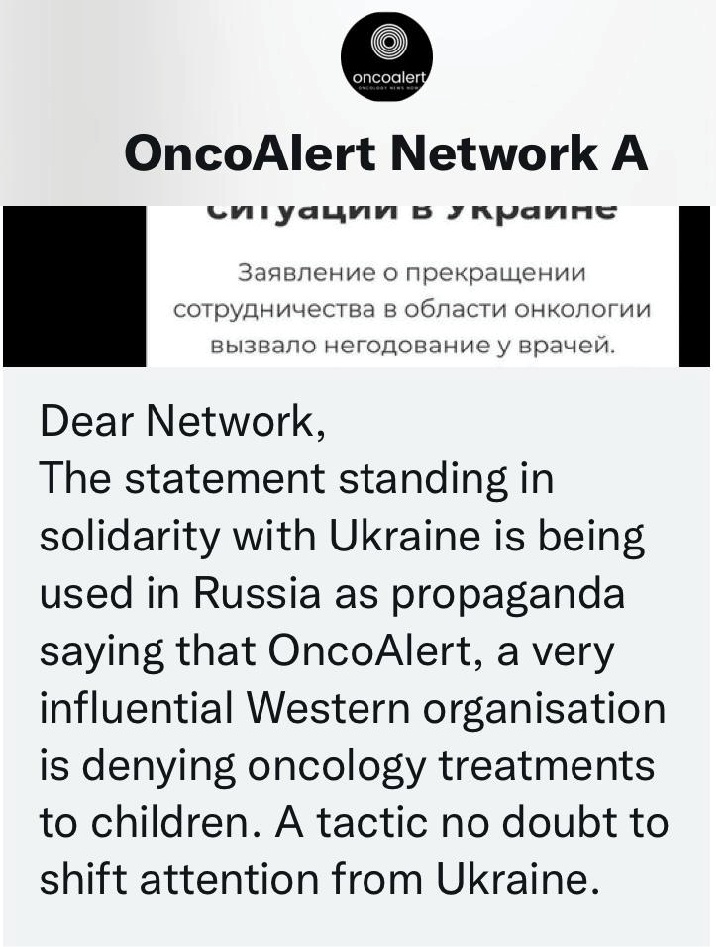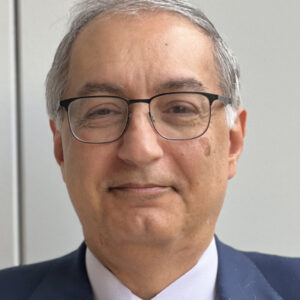It was awe-inspiring to see how quickly the world’s science came together to address the COVID-19 pandemic—and much was learned. Academic institutions, big pharma, government, and foundations stepped up to do everything possible in an unprecedented way. Two years later, the results are evident as life is returning to normal.
The invasion of Ukraine, similarly, is a challenge for the world’s science to respond to the human tragedy in a coordinated and timely manner.
There is a window of opportunity to help—there’s no time to waste. It is not too early to do something positive. This includes connecting scientists and clinicians in Ukraine as well as Russia to support those who wish to leave or are otherwise endangered. Our research labs stand to benefit from the brilliance of colleagues with diverse perspectives and points of view.
In the clinic, there are opportunities for available allied health professionals as they await a safe return to their country. With severe nursing shortages in the U.S., such impact could be felt in numerous hospitals now working at reduced capacity.
Funding from the government, including NCI and CDC, professional societies, ACS, etc., should support coordination. Institutions tend to move slowly, but it is clear that the end users can’t wait, and the scientists willing to help are ready to do so. It would certainly help if the visa programs facilitated quick admission and employment.
Consider the speed with which the scientific community has already responded to the Ukraine challenge:
Russian troops started crossing the Ukraine border on Feb. 24.
By the morning of Feb. 26 in the Western hemisphere, over 100 scientific research labs from throughout the world, including many in the United States, had offered to help Ukrainian researchers, and the list has kept growing. I added our lab at Brown University to the list that day, hoping that we could help in some way. I was delighted to see other colleagues from Brown, and the Legorreta Cancer Center, including Jeff Bailey, MD, PhD, Alexandra Deaconescu, PhD, and Tom Bartnikas, MD, PhD, also sign up.
By Feb. 27, the list grew to over 300, and by the morning of March 2, over 500 labs had offered to host and support colleagues affected by the Russian invasion of Ukraine. A number of these are academic cancer research labs. As awareness increases, many leading labs are offering to help, and other research opportunities are opening up in industry.
By March 2, the number of refugees was estimated at 660,000 and rising rapidly as the horrible, visible destruction throughout Ukraine continued. And, sadly, by March 3, the first major Ukrainian city, the Black Sea port of Kherson, had fallen. The refugee count had exceeded one million according to the UN and was estimated to eventually reach four million.
Connect cancer scientists & clinicians to opportunities @ChrisMelzer_NYC @Refugees @TheCancerLetter @NCIDirector @AmerCancerCEO @jrgralow @AACR_CEO @OncoAlert
— Wafik S. El-Deiry, MD, PhD, FACP (@weldeiry) February 27, 2022
368,000 Ukrainians flee to European countries, including some that previously spurned refugeeshttps://t.co/3Nmx58QZVX https://t.co/jKBVN3GgQt
A grim picture of death and destruction is emerging for what is quickly happening in Ukraine’s cities as they fall to barbaric military rule.
Suggested immediate actions include:
- Emergency funds need to be urgently allocated within the U.S., specifically to support the relocation and employment of refugees who have already left Ukraine and are ready now to contribute to research and clinical care in the U.S.
- Cooperation for safe passage, travel, and housing for those who wish to leave Ukraine as well as those who have left and wish to come to the U.S. They will urgently need living expenses, stipends, and permission to work.
- Connections can be made to the refugees and working through the Red Cross, UN, and the U.S. government could facilitate communication.
- Coordination to match those who wish to leave with those who would help the researchers and clinicians. While the list of over 500 labs is general, the effort in cancer could be more focused and organized at an early stage.
- The creation of a web portal could facilitate Ukrainians or Russians on the internet to directly see and express interest in opportunities. Upcoming national cancer meetings such as the annual AACR meeting in early April this year in New Orleans or others could also help with networking and communication or interviews among interested scientists. A “connectivity map” and AI are tools that come to mind.
- Those connected with Ukraine and Russia could help identify and communicate with those who would leave. It is clear there are many Ukrainians and Russians throughout the world who are connected in real time to colleagues and family members. More awareness of the opportunities to help can be communicated through social media and personal contacts, in the interest of speed and efficiency. The impact of social media as far as dissemination of information and connecting professionals should not be underestimated. Hashtags can be incredibly helpful.
- The resources and infrastructure to help are urgently needed. Attention to the scientific research and healthcare impact should be given a high priority as the humanitarian efforts are underway.
- A united effort from professional societies, foundations, and NCI early on could help with university and hospital coordination. There are complexities and things that take time like visas and work permits.
As an example, Brown University is actively supporting students, faculty, and staff through various services and programs internally. These include student support services, faculty and staff assistance programs, and scholar services.
Outwardly, Brown University’s President Christina Paxson informed the university community of existing resources that can help, including partner organizations such as the Scholars at Risk network and the New University in Exile Consortium, to provide a safe academic home for Ukrainian scholars. I am proud to be at such a university that is proactively addressing this current global crisis.
I was delighted to see that Governor Daniel McKee of Rhode Island wrote to President Biden on Feb. 28 to welcome Ukrainian refugees to a place of freedom and independence.
Our message to Ukrainian refugees: You are welcome here. pic.twitter.com/WrL5Ok8e6x
— Governor Dan McKee (@GovDanMcKee) February 28, 2022
Funding from the government, including NCI and CDC, professional societies, ACS, etc., should support coordination. Institutions tend to move slowly, but it is clear that the end users can’t wait, and the scientists willing to help are ready to do so.
The solidarity and strong support in the U.S. for Ukraine against the blatant, deplorable, and unprovoked aggression was solidified in President Biden’s March 1 State of the Union Address, along with a commitment of U.S. $1 billion to help Ukraine. As these substantial resources and others are deployed, let’s not forget Ukraine’s scientists at all levels, bioengineers, physicians, and other healthcare professionals as the need keeps growing.
It has been very interesting to learn about Ukraine’s advanced research and clinical oncology capabilities. Amazingly over the weekend, social media documented at least two bone marrow transplants performed in Kyiv while rockets were falling. It is sad that there is little regard for human life in the current invasion.
This lucky girl got a bone marrow transplant for #AplasticAnemia today in a #Ukraine hospital basement by Dr. Oleksandr Lysytsia while Russian rockets fell outside. She’s cured of her rare disorder. I hope she survives this war. #StartWithHillary 🇺🇦 pic.twitter.com/26XkIXAo58
— Hillary McKibbin (@StartWithHills) February 26, 2022
Additionally, Also my colleagues from national Cancer Institute (Kiev) did auto SCT for lymphoma patient in a bombshell!!! You cannot plan transplant based on a bombing timetable😡 @TheEBMT @EHA_Hematology @ASH_hematology @StefanoLuminari @AnnaSureda5 @Mohty_EBMT https://t.co/imtVrbV6WY pic.twitter.com/yH8HdBgt1E
— Tanya Skrypets (@TSkrypets) February 27, 2022
There is Russian propaganda claiming that powerful Western oncology groups such as the relatively young @OncoAlert network are refusing to perform bone marrow transplants on Russian children.
This is how works a Russian propaganda! @OncoAlert they mentioned you and told that European oncologists refused to treat Russian children! While you only stop collab…
— Tanya Skrypets (@TSkrypets) March 3, 2022
Here is a link, you can translate officially https://t.co/g4R6axNmT9 @KaterynaFilone1 @knowyournodes pic.twitter.com/XbwwXBxXHt
Note from Gil Morgan, MD, who leads the OncoAlert Network: it is clear that members of this network who are leaders in the oncology world could help with attracting oncologists as well. It should be noted that it is unbelievable for anyone to suggest that children with cancer would be denied life-saving bone marrow transplants based on their race, ethnicity, or country of birth.
Science is very strong in Ukraine. Here is a history of the General Assembly of the National Academy of Sciences of Ukraine.


Looking at cancer specifically, Ukraine has a National Cancer Institute, which was founded in 1920. Located in Kyiv, this institution is a full member of the Union for International Cancer Control. A major oncology journal in Ukraine is ONCOLOGY: Scientific Practical Journal.
In an interview published by WHO on Nov. 11, 2021, Sergii Sikachov, a Ukrainian oncologist, described Ukraine’s challenges of building a modern cancer control system and the challenges presented by the COVID-19 pandemic.
“Cancer surgery is changing very quickly,” Sikachov said. “If you know English, you have access to a lot of useful information. You can provide medical care that is in line with international standards in Ukraine, but we need an enabling environment to do so.”
Ukraine has a complicated history with the Nobel Prize. For decades, Ukrainians were excluded from getting Nobel Prizes because Ukraine did not have statehood status. These individuals are listed under Ukraine and have won Nobel Prizes:
- Georges Charpak*, born in then Poland, now Ukraine, Physics, 1992
- Roald Hoffmann*, born in then Poland (Second Polish Republic), now Ukraine, Chemistry, 1981
- Selman A. Waksman, Physiology or Medicine, 1952
- Shmuel Yosef Agnon, Literature, 1966
- Svetlana Alexievich*, born in Ukraine, Literature, 2015
- Ilya Ilyich Mechnikov, Physiology or Medicine, 1908
Based on what I have seen, it would seem the president of Ukraine, Volodymyr Zelenskyy, is a strong candidate for the Nobel Peace Prize as well, given his stature, courage, and recent speeches and stand. There is much hope for the world when a leader tells their government they don’t want their picture on their walls, but to put up their childrens’ pictures and to think about them when they make their decisions.










